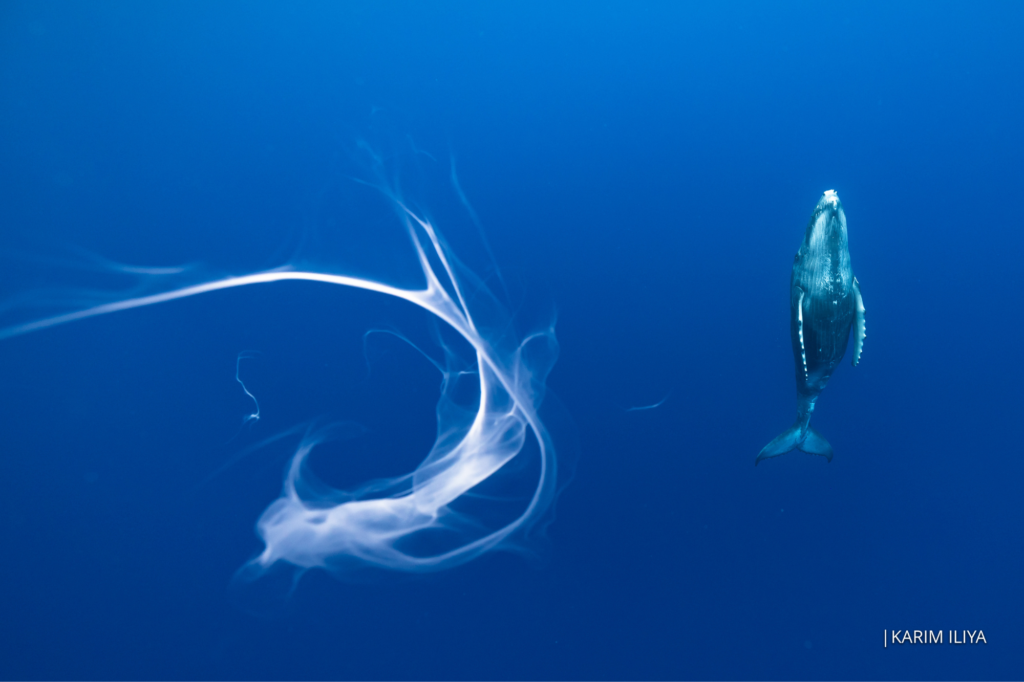
In this series of events, which are part of Jenni Ramone’s project on breastfeeding narratives and representations, Jenni is joined by photographer Karim Iliya, writer ‘Pemi Aguda, and nurse educator Meg Moorman. These conversation events invite us to think about how the arts and humanities can transform the way we practice and understand breastfeeding, health, and our interactions with other animals and the planet.
Join Karim Iliya discussing the hidden underwater worlds and other natural places he has portrayed in photography and films, with NTU’s Jenni Ramone.
Karim Iliya is a photographer, filmmaker, whale swimming guide, and former dearMoon crew member based in Iceland. He also co-founded Kogia, a nature conservation non-profit. Karim grew up in the Middle East and Asia and developed an insatiable curiosity for the natural world which has taken him into the midst of exploding volcanoes, battling whales, ice worlds of the Arctic, and many of the incredible places where humans and animals make their homes. Through his photography and films, Karim takes his audiences to hidden underwater worlds and documents other natural places in an effort to protect Earth’s delicate ecosystems. Karim has worked in over 50 countries, won multiple awards, and his work has been featured in numerous distinguished magazines, documentaries, and publications.
For more on Karim’s work, check out his website and for more of his photos follow this link to his Instagram.
Join fiction writer ‘Pemi Aguda reading from and discussing her recently published collection of short stories, Ghost Roots, with NTU’s Jenni Ramone.
‘Pemi Aguda is from Lagos, Nigeria. She has an MFA from the Helen Zell Writers’ Program at the University of Michigan. Her writing has been published in Granta, Zoetrope: All-Story, Ploughshares, and One Story, among others, and won O. Henry Prizes. Her novel-in-progress won the 2020 Deborah Rogers Foundation Writers Award, and she is the current Hortense Spillers Assistant Editor at Transition Magazine. Ghostroots, a finalist for the 2024 National Book Award in Fiction, is her first book.
For more information about Pemi’s work, please visit her website, webstore, and Instagram
Join nurse educator Meg Moorman discussing her project on using visual thinking strategies to enrich nursing education and patient care, and considering how the strategies might be applied to breastfeeding support, with NTU’s Jenni Ramone.
Meg Moorman is a pioneering nurse educator whose innovative integration of the arts into nursing education has significantly influenced the development of clinical judgment and holistic care practices. As a Clinical Associate Professor at Indiana University School of Nursing, she also serves as the Coordinator of the MSN in Nursing Education Program and directs the Faculty Innovating for Nursing Education (FINE) Research Center. Dr. Moorman’s contributions have been recognized nationally; in 2022, she was inducted as a Fellow into the National League for Nursing’s Academy of Nurse Educators, honouring her innovative approaches to nursing education. She has presented her research internationally and consulted with various universities and healthcare workers throughout the world. Her ongoing efforts continue to inspire educators to incorporate humanities-based methodologies, like visual thinking strategies (VTS), to enrich nursing curricula and ultimately enhance patient care outcomes. Through her research and practice, Dr. Moorman has demonstrated that VTS can foster a safe learning environment, encourage diverse perspectives, and improve medical professionals’ ability to interpret complex clinical situations. Her work has shown that engaging with art through VTS not only sharpens visual literacy but also cultivates empathy and reflective thinking among nursing students. She was recently accepted into the Harvard Macy’s Art- Museum-based Health Professions Education Fellowship.
Form more information about Meg’s work, please follow this link to their website, and a feature written about this project can be found here.
In our latest archive display we take a closer look at Descendants of the Dragon, 1991. This exhibition highlighted the Chinese community within Britain, looking at the importance of the dragon within celebrations. The exhibition showed many sculptural/puppet works which were related to the dragon and other animals that are present in ritual celebrations in Chinese-British culture.
Descendants of the Dragon showcased Chinese artists based in the East Midlands, as well as works from China. The majority of the space was filled with sculptural works that were used in ritual and festival settings featuring a large dragons head at its centre, and a long boat to the side. The ceiling of the gallery was covered with kites of different animals, including cranes, eagles, owls, and butterflies.
Curated by Alex Jovčić-Sas, the Archive cabinet contains photographs from the original exhibition, alongside condition drawings/reports for the main piece which sat in the centre of the gallery. There are also some of the original captions which have been written in mandarin and translated into English.
This exhibition has recently been researched by Dr Vivien Chen who was looking into diasporic East Asian artists in the East Midlands.
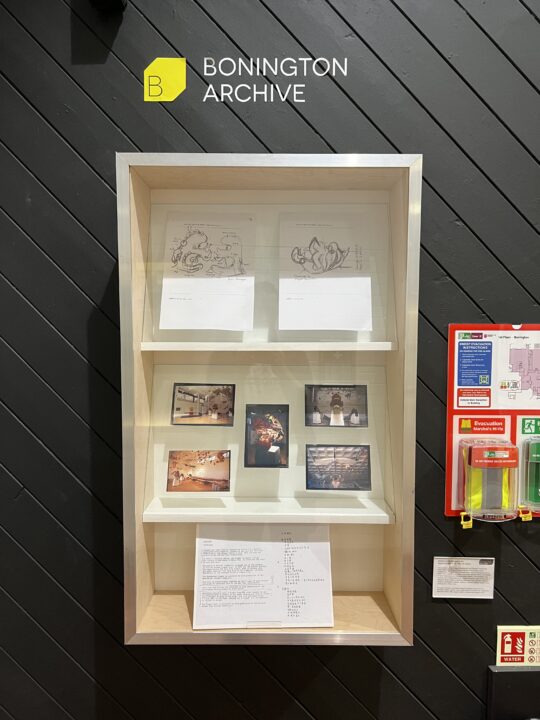
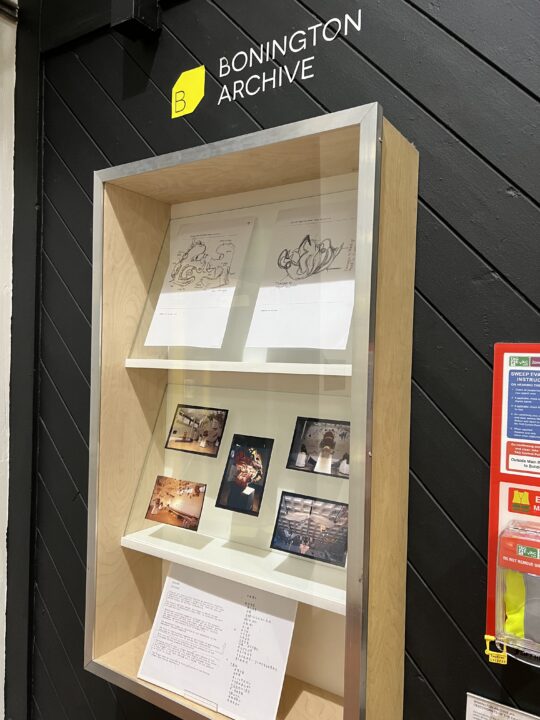
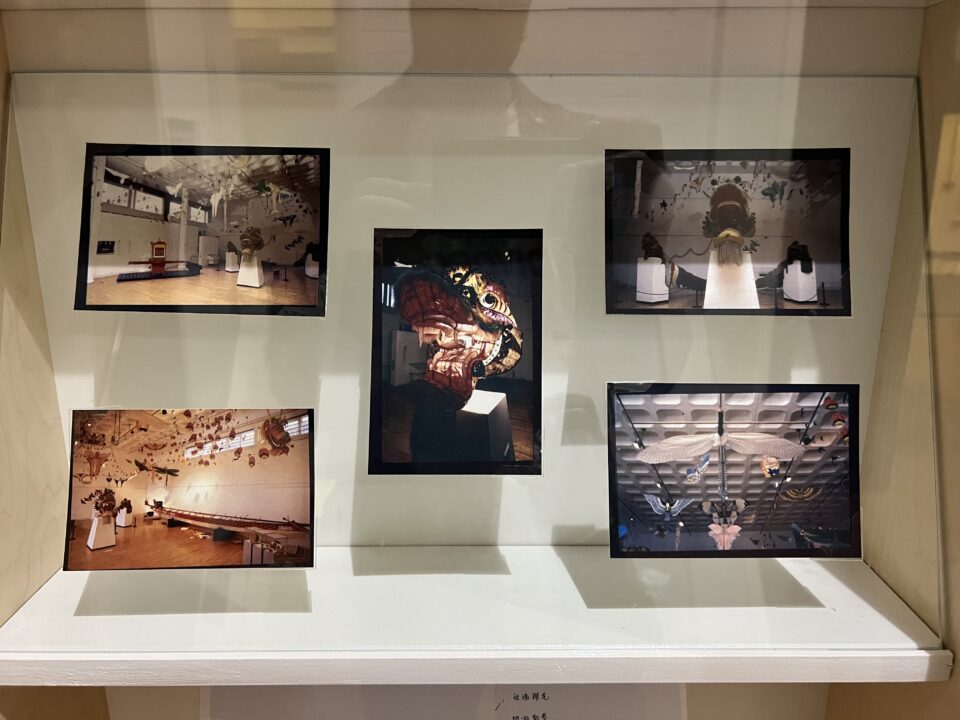
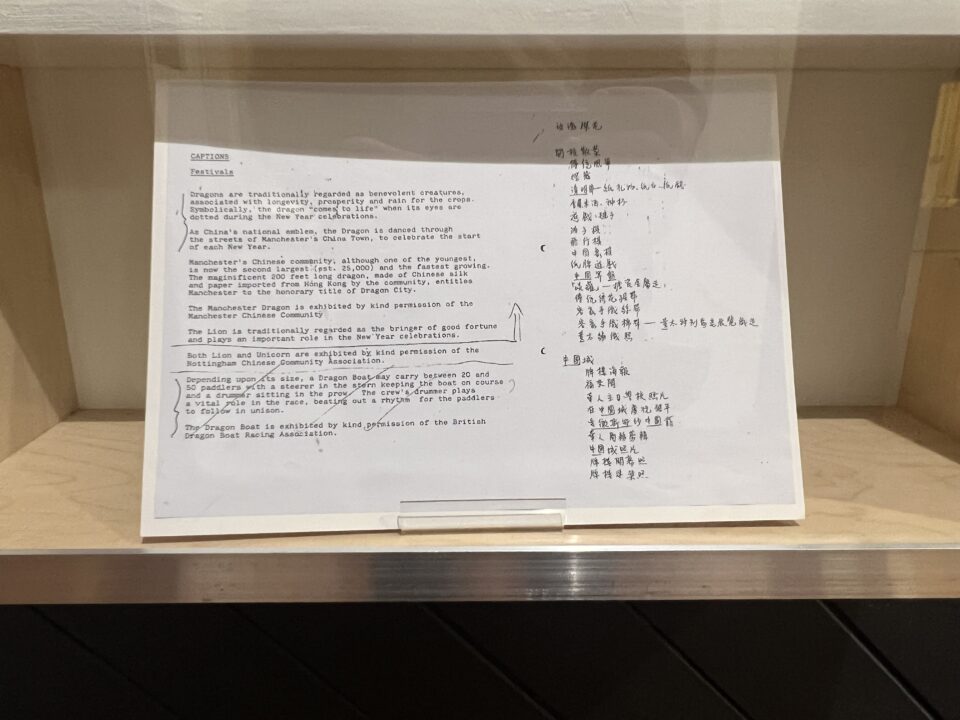
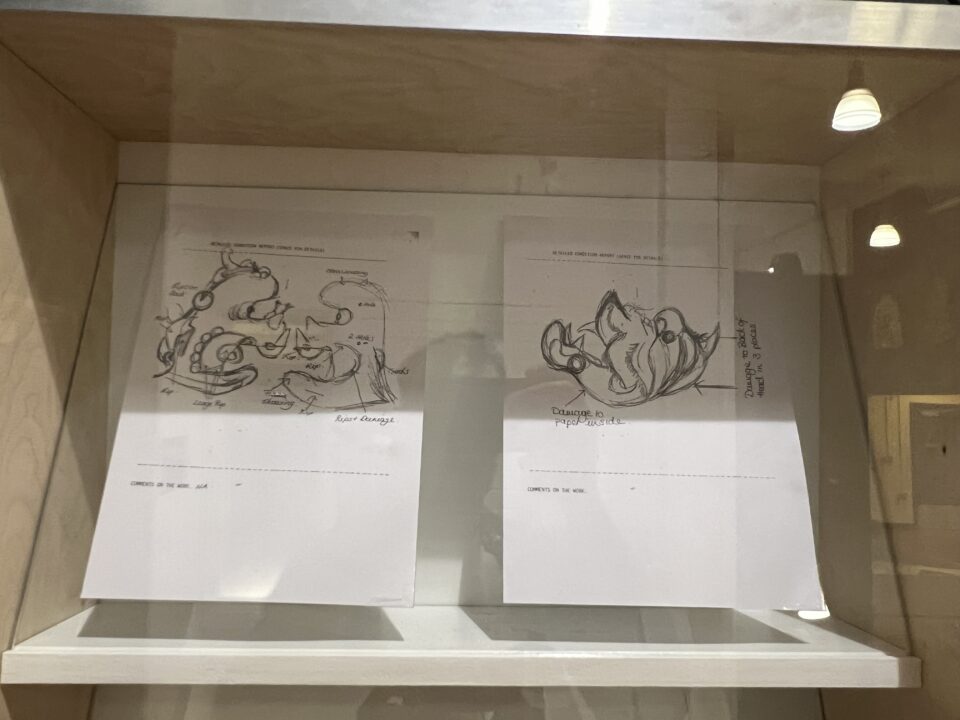
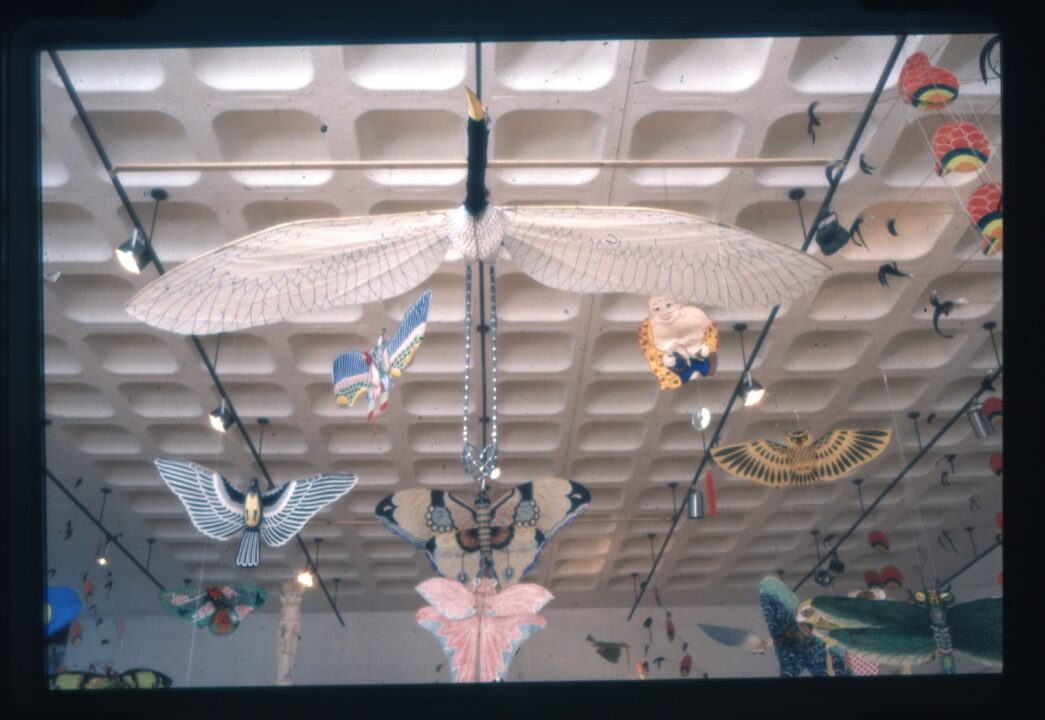
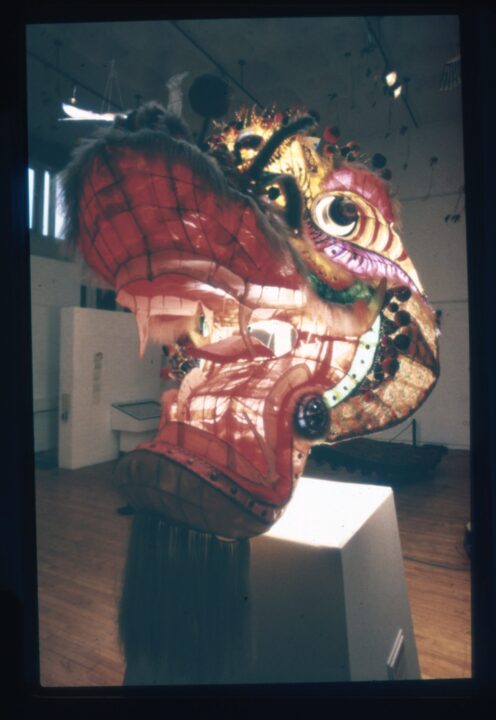
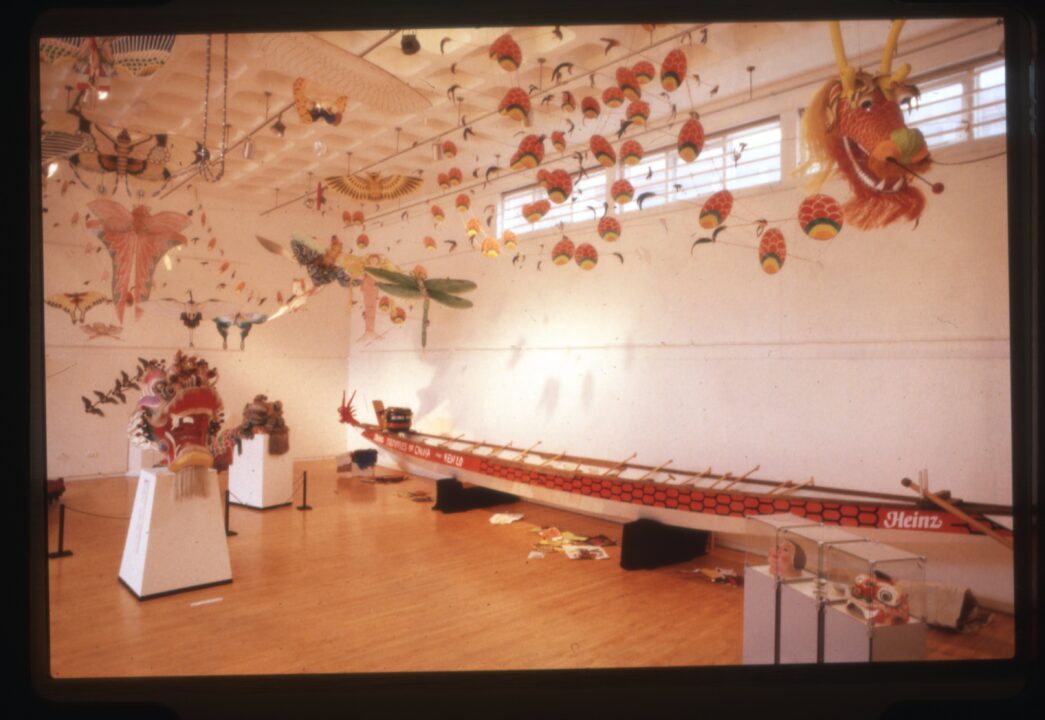
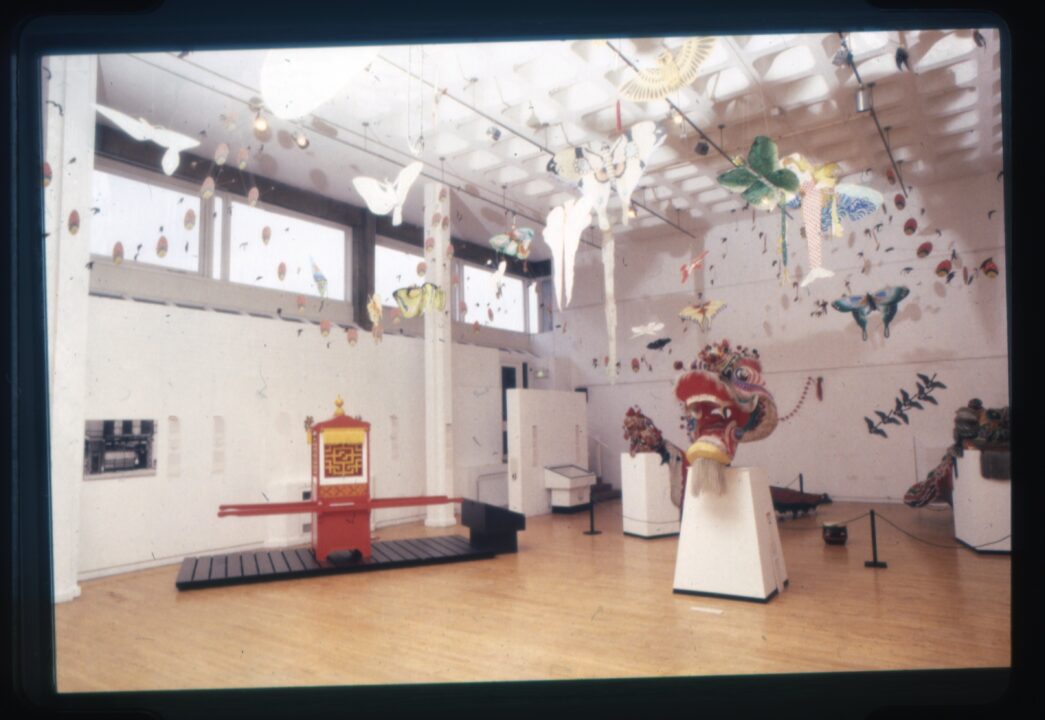
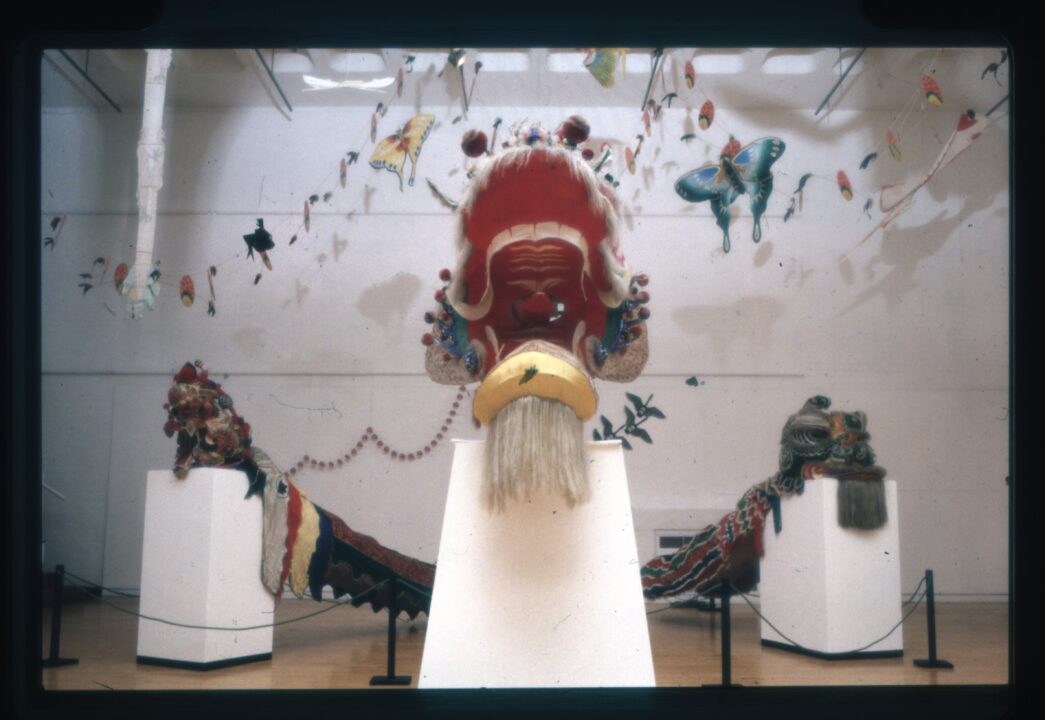
This event will be live-streamed on YouTube, Wednesday 16th April, 7-8.30pm, you can RSVP here.
Join us for a free online conversation event between multidisciplinary artist Aziza Kadyri, and Francesca Stocco, PhD researcher of textile art at Nottingham Trent University.
The talk will explore Aziza’s contemporary art practice, which blends the Central Asian tradition of suzani embroidery with AI technology. Combining physical stitching with digital tools, she reformulates suzani motifs and infuses them with personal and current socio-political narratives.
Together, the speakers will discuss the evolving meaning of textile craft in Aziza’s practice and in the context of Uzbekistan’s ongoing cultural transformation. Aziza has represented Uzbekistan at the 2024 Venice Art Biennial, along with the Qizlar collective and suzani master Madina Kasimbaeva. Set within a deconstructed theatre backstage, the exhibition explored migration, identity, and belonging through the lived experiences of Central Asian women. Through her collective and multi-media practice, Aziza challenges the Euro-centric division between craft and the fine arts, while also questioning the notion of single authorship in artistic production.
This event is part of Formations, Bonington Gallery’s ongoing events programme that is delivered in partnership with the Postcolonial and Global Studies Research Group.
To watch the live stream via YouTube, click here
Aziza Kadyri is a multidisciplinary artist focusing on experimental costumes, textiles, performance practices, and immersive technology. Her work has been showcased at the Uzbekistan National Pavilion at the 60th Venice Biennale, Pushkin House (London), Fondazione Elpis (Milan), and KINDL – Centre for Contemporary Art (Berlin). This year, she will participate in the first edition of the Bukhara Biennial, collaborating with suzani master Yulduz Mukhiddinova, and the 5th Hangzhou Triennial of Fibre Art.
Francesca Stocco is a PhD researcher at Nottingham Trent University. Her research specialises on the sociology of the art market and focuses on the resurgence of textile art in the twenty-first century. On the side, she runs the editorial and design project Filanda n.18 that explores textiles’ cultural narratives.

Wednesday 4th December, 1-2pm. Book here (only open to NTU students)
Bonington Connect is a new series of get-togethers at Bonington Gallery where themes within our exhibitions can be discussed and explored in a friendly and informal setting. Led by MFA student Vidhi Jangra, this session will explore photography from a working-class perspective, drawing upon ideas from Susan Sontag and Roland Barthes.
By students and for students, Bonington Connect invites the NTU student community to engage in thought-provoking conversations in response to Bonington Gallery’s exhibition programme. Aimed at creating an accessible atmosphere, this series encourages students at all levels of study to connect with each other and explore themes & ideas in an informal, open and engaging setting.
Each event in this series will explore specific themes and highlight influential thinkers in the arts. The inaugural session, led by MFA student Vidhi Jangra, will focus on working-class perspectives in the arts, drawing on the current exhibition After the End of History: British Working-Class Photography 1989-2024. Referencing theories from Susan Sontag’s On Photography and Roland Barthes’ Camera Lucida, the session will examine the layered dynamics between photographer, subject, and viewer. Engaging directly with the exhibited works and theoretical insights, the talks promise to be both informative and conversational.
A 30-minute talk in the gallery will be followed by refreshments in the Bonington Atrium, where you’re invited to continue the conversation in a friendly and informal atmosphere.
Donald Rodney (b.1961, d.1998) studied at Nottingham Trent Polytechnic, now Nottingham Trent University, between 1981 and 1985. Here, Rodney’s practice moved from painting to an experimental multimedia approach, through which he established an artistic language addressing subjects including racial identity, Black masculinity, chronic illness, and Britain’s colonial past.
Sketchbooks were an integral part of Donald Rodney’s practice from 1982 onwards. His sketchbooks contain: preliminary studies for artworks, records of past exhibitions and various writings; glimpses of Rodney’s diverse personal, cultural, social, and political influences. This vitrine exhibition collates archival material to present a snapshot of Rodney’s time as a student in Nottingham, amid his involvement with local, national, and global socio-political discourses. Rodney began using sketchbooks at the age of twenty-two as a student, and he filled forty-eight sketchbooks by the time of his death in 1998 from complications related to sickle cell disease.
Rodney met fellow artist Keith Piper at Nottingham Trent Polytechnic, and together they moved in with electronics student Gary Stewart. At their address — 3 Lindsey Walk, Hyson Green Flats — Rodney, Piper, and Stewart provided a meeting place for artists, writers, makers, and thinkers: fellow students, local community members, and persons from their national networks. The BLK Art Group was also formed by Rodney and fellow students in 1983, using 3 Lindsey Walk as its address. The BLK Art Group was a collective of young Black artists and curators who exhibited primarily in Birmingham and London. This was an important and necessary group, but BLK Art Group has also been retrospectively attached to activities by British artists in the 1980s who were not affiliated with the collective. This attachment has been critiqued as a reduction and conflation of an important reality: that there were many unique, different, and individual Black British artists working across the UK long before The BLK Art Group, throughout the 1980s, and, of course, far beyond and into the present day.
Rodney, and fellow students, also engaged in artistic activity outside of Nottingham Trent Polytechnic, by organising exhibitions, conferences, talks, and events across the midlands and nationally. These included The First National Black Art Convention of 1982, at Wolverhampton Polytechnic, and Pan-Afrikan Connection, which involved a series of exhibitions in Bristol, Nottingham, Coventry, and London between 1982-1983.
For further insight into Donald Rodney’s life and art, please visit Donald Rodney: Visceral Canker at Nottingham Contemporary until 5 January 2025. This exhibition includes all of Donald Rodney’s surviving artworks including painting, drawing, and installation, as well as sculpture and digital media.
This exhibition has been curated by Joshua Lockwood-Moran with the exhibitions team at Nottingham Contemporary.




















Launch event
Join us for the launch of this exhibition and After the End of History: British Working Class Photography 1989 – 2024 on Thursday 26 September 2024, 6 – 8 pm. Book your free ticket now.
In the spring term at Nottingham Trent University, students on NTU English module Black Writing in Britain were joined by poet and Caribbean literature and culture specialist Emily Zobel Marshall and novelist Jacqueline Crooks.
In March 2024, poet and Caribbean literature and culture specialist Emily Zobel Marshall visited NTU to read from and discuss her new poetry collection, Bath of Herbs.
Emily Zobel Marshall is a Reader at Leeds Beckett University, specialising in African and Caribbean folklore and literature of the African diaspora. Emily is also an expert in the role of trickster figures in the literatures and cultures of Africa and its Diaspora and has published widely in this area. Bath of Herbs is a vivid collection of poetry drawing on the poet’s life and history, including her childhood in rural Wales, mixed race identity, the British North, Martinique, illness, recovery, mourning, and family.
In this event held at NTU’s Clifton campus, Emily reads from and discusses her poetry, her literary inspiration from her grandfather, the writer Joseph Zobel, and answers questions from NTU English students on Jenni Ramone’s Black Writing in Britain module.
In April 2024, students on NTU English module Black Writing in Britain were joined by novelist Jacqueline Crooks.
Jacqueline Crooks was born in Jamaica and moved to London as a child. Her short story collection, The Ice Migration, was longlisted for the 2019 Orwell Prize in the Political Fiction category, and she has also been shortlisted for the Asham and Wasafiri New Writing awards. Her short story, ‘Silver Fish in the Midnight Sea’, was shortlisted for the BBC National Short Story Award 2019. Her stories have appeared in Wasafiri, Virago, Granta and Mslexia. Fire Rush is her debut novel and it has been shortlisted for the Women’s Prize for Fiction, the Jhalak Prize, and the Waterstones Debut Fiction Prize, and chosen as an Observer Best Debut Novel of the Year and a New Yorker best books of 2023. The narrative of Fire Rush takes place between late 1978 and early 1982. It is the story of Jamaican-British woman Yamaye, her friends, her search for her mother, and dub reggae.
In this event, Jacqueline Crooks reads from and discusses her novel in conversation with Jenni Ramone.

‘Moving from silence into speech is for the oppressed, the colonized, the exploited, and those who stand and struggle side by side, a gesture of defiance that heals, that makes new life, and new growth possible. It is that act of speech, of “talking back” that is no mere gesture of empty words, that is the expression of moving from object to subject, that is the liberated voice.’
– bell hooks, “Talking Back.” Discourse (1986), p. 128.
Talking Back interdisciplinary conference is an in-person conference that will be held in Nottingham, United Kingdom. It will form a prominent part of Transform, a city-wide collaborative and transformative endeavour involving major cultural organisations across Nottingham in summer 2024, led in partnership by New Art Exchange.
Reflecting on speech as a radical force against the systemic silencing of marginalised voices (hooks, 1989), we would like to invite proposals from writers, academics, creatives, and activists alike who are interested in exploring critical and creative approaches to decolonial activism, reclamations of culture and identity, and the transformative power of voice.
We invite contributions that explore marginalised voices, representations of dissent against western hegemony and rigid binaries, and resistance to silencing and structural oppression. We welcome critical and creative approaches to proposals from participants of all genders, racial groups, and faith groups.
The conference is free to attend and will take place at Bonington Gallery, Nottingham Trent University, Nottingham, England on Tuesday 25th June 2024.
The conference will be followed by an open-mic poetry and networking event, centred on the theme of ‘talking back.’
Suggestions include and are not limited to:
Please submit a 250-word abstract/proposal for a 20 minute paper or presentation along with a 100 word biographical statement to: talkingbackconference@gmail.com
Please title your email with the type of submission you are applying for:
20 minute paper: Talking Back Conference 2024
20 minute presentation: Talking Back Conference 2024
The conference is free to attend. We are also able to offer 2-3 small travel bursaries to support self-funded and disadvantaged students with travel costs. If you wish to apply for one of these bursaries, please express your interest at the bottom of your abstract, along with a brief summary explaining why you require the support.
Deadline for all submissions: 1st April 2024.
Conference Date: 25th June 2024
Email us at talkingbackconference@gmail.com if you have any questions.
We look forward to receiving your submissions.
This conference is made possible by generous funding and support provided by Bonington Gallery and the NTU’s Postcolonial and Global Studies Research Group.
For the third and final event from our Plants Beyond Empire series, Claire Reddleman and Sophie Fuggle will explore how plants have become aligned with human ideas about time, seasons and cycles.
Many plants have been co-opted into colonial and capitalist ways of understanding time. Reddleman and Fuggle will begin by taking up the case of the Ginkgo Biloba – often described as a ‘living fossil’ due to the fact it has remained unchanged for over 80 million years.
Drawing on Claire Reddleman’s research, and its arrival in Britain in the 18th Century, they will consider the ways in which the ginkgo has become an important presence in the British landscape. The speakers will then look at the castor bean, a very different plant, which has been used by humans for at least 24,000 years. In the late 19th century, the castor bean’s best-known product, castor oil, started to be used as a lubricant for car and aircraft engines. It enabled greater speed and fluidity, and joined fossil fuels in the service of capitalism’s quest for ever faster, ever more efficient movement. Donna Haraway, Anna Tsing and others call this era the ‘plantationocene‘, to identify how capitalism, colonialism and labour have, often destructively, shaped the natural world.
Plants Beyond Empire is a new series of conversations starting in February 2024, as part of our Formations programme, in partnership with the Postcolonial and Global Studies Research Group. The events will explore a range of creative and community interventions aimed at understanding complex human-plant entanglements within postcolonial Britain and beyond.
Sophie Fuggle’s research focuses on connections between empire and ecology. She has conducted extensive field and archival work in French Guiana, New Caledonia and Vietnam looking at the legacy of France’s overseas penal colonies. Most recently she has begun to explore the colonial, cultural histories of the castor bean plant.
Claire Reddleman is Lecturer in Digital Humanities at the University of Manchester and works on digital cultural heritage, visual methods, mapping and contemporary art including her recent project ‘Ginkgos of the British Isles‘. She is a photographic artist and can be found online at www.clairereddleman.com / @reddlemap
Photo credit – dendrologista by Claire Reddleman. Map credit – 1725 Kaart van de provincie Utrecht, François Halma, collection of Universiteitsbibliotheek, Utrecht
Coinciding with The Art Schools of the East Midlands exhibition, join us for a free event that explores the role of British art schools in shaping fashion, music and club culture over the last 40-50 years.
We will be joined by esteemed writer and curator Paul Gorman, who will discuss his work’s engagement with the significant role played by art schools, their educators and attendees in the broader culture.
Join us as we explore this past and consider it against the wider influence of the notion of the ‘art school’ on other forms of cultural and creative production.
Paul Gorman is a writer, curator and commentator on visual culture. His Books include The Look: Adventures in Rock & Pop Fashion, Mr Freedom – Tommy Roberts: British Design Hero, The Life & Times of Malcolm McLaren and The Wild World of Barney Bubbles. The paperback of his latest book, Totally Wired: The Rise & Fall of the Music Press was published in summer 2023.
Gorman has written for many of the world’s leading publications and curated exhibitions in the UK, continental Europe and the US.
Photo of Paul Gorman by Toby Amies.
Re-sensitised Symposium re-visits, reflects and re-lives the last seven years of the Sensitive Skin festival.
It brings together a diverse group of artists, all of whom have been part of the festival since its inception in 2000, pondering on the question ‘How has Sensitive Skin evolved over the past seven years and how has Live Art and Performance practice developed during that period?’
Offering talks, presentations, lectures and an “artists in conversation’ panel throughout the day, the event will culminate in a celebration closing this year’s festival, including two performances from Rajni Shah and Harminder Singh Judge.
Leibniz